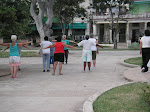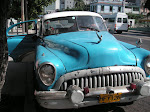Talking Politics
While I'm still registered as a republican, I haven't voted for one since 1988. I mention this, not because I want to talk politics, but as an introduction to this blog chapter on politics in the US and Cuba. Basically, I'm not a strong party member, no matter which party thinks it can claim me. We have a friend who is a staunch republican, and I do what I can to avoid any political discussions with him. I know I can't change his mind with my liberal views (and vice versa, I'm sure), and so I certainly wouldn't want to lose his friendship because of a conversation that can't go anywhere.
But if I were more of a political animal, I would feel free to go further than showing a bumper sticker or two on my car. I might send a letter to the editor or speak at a public meeting. Those who don't agree with me would just ignore me anyway.
But my visits to Cuba provoke questions from my friends: "What does he think of the US Embargo?" or "How does she feel about the communist government there?" I'm really happy to say I don't know the answers to questions like that. The reason is that I studiously avoid talking politics in Cuba. It's not because I'm worried I might be picked up and jailed. Hardly! It's more because I'm there as a guest in someone else's country with different political and economic systems, and our two countries' governments more often criticize each other than not. Now many Cubans have lived their entire lives under the present government, and they know nothing else. It's unfair to criticize any facet of their country when I go there as a guest. It's also unfair to compare any facet of US life with what obtains in Cuba.
People in each nation have been denied a close relationship with the other, and there is far less interchange between the two countries than there should be. For those who have traveled there or those who are about to, I counsel them to adopt my apolitical attitude, not only while there, but also here at home.
The Cuban-American community in Miami was once more homogeneous in their opposition to the Cuban government. They had nearly all risked their lives to escape, making an arduous boat trip here, and their antipathy to their former government was palpable. Today, many Cuban Americans can't remember living there, and we find an almost 50/50 split in opinion on many political questions. One way to gauge this is to take the daily little poll on the front page of El Nuevo Herald, Miami's Spanish newspaper.
Today, even the two governments are changing their tunes a little. Raul Castro has eased the rules on the use of cell phones and privately operated small businesses. Barack Obama has eased on some travel restrictions on US citizens wanting to go to Cuba.
Many Cubans get permission from Cuba and a visa from the US to visit. It takes time and a reason, but it certainly is not an island prison keeping everyone home. Some Cubans are quite well-traveled. And the current impression is that US citizens can't go to Cuba. Also wrong. You need a reason, but hundreds of thousands have made the trip legally. I've now done it six times.
For me, animal protection is the reason I go, and we try to help a really fine organization that does good work for Cuba's animals. Many other Americans go for research, education, history, or to visit relatives.
There are plenty of reasons to visit here or there, and avoiding political discussions seems to me to be a small price to pay for travelers on either side of the Florida Straits.
Les Inglis
Friday, August 19, 2011
Subscribe to:
Post Comments (Atom)






























































































No comments:
Post a Comment